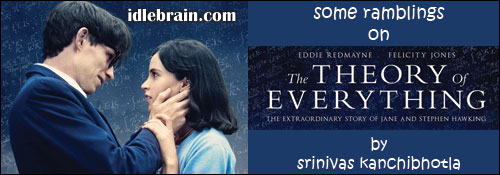
'They said two, you had so many' - Jane Hawking, Stephen's wife
That Stephen Hawking is a bonafide genius, hailed as the most brilliant mind alive, able to take the most abstract of concepts, time, and turn it into his staple topic, all this without the faculty of a speaking voice and without being capable of moving a muscle, is a miracle of nature (though, he has trouble acknowledging the word 'miracle', as that implies a puppeteer somewhere commandeering the events down below). That it is a curious twist of irony and fate, when he was diagnosed with a debilitating neurological disease in his early 20s just when he was stretching his legs in the field of cosmology and was given a prognosis of certain death in couple more years, and again by some miracle of nature, he finds himself alive and kicking well in his current 70s now, all the while expanding away the horizons of human understanding on space and time, both of which he has sworn off on a long time ago in the physical world. He has reconciled with space and time only in his mind. Now the question. Would Stephen Hawking have enjoyed the rock star status he currently holds in the scientific community had he not been robbed of his motor and speech skills? It is like asking would Jesus Christ be just as popular had he passed away by natural causes and not because of crucifixion on a cross? The logical answer for both the questions is a categorical yes. Stephen's genius had not sprung nor was it honed by some overcompensation of his system for the rapid deterioration of the rest of his body. His mind (and in a very funny sequence, his manhood) strangely remained unaffected by the disease and he made creditable contributions with the both of them over a period of time producing results that simply astounded the world. So when a movie is made on Stephen Hawking, should be focus be on his mind that stayed active and alert all throughout the harrowing period, or should it be about his work that stayed brilliant during the same timeframe regardless of what was happening to his body? And 'The Theory of Everything' makes the right choice, that a movie about Stephen Hawking should never be about his mind and his body nor his work nor his genius alone. With a loaded title, the movie is about everything around him, how the support system around him sustained and encouraged the brilliance in him to flower and flourish.
'The Theory of Everything' is about Stephen's marital relationship with Jane, who in a fit of youthful idealism and romanticism as college sweethearts, married Stephen just when his physical graph was about to go south knowing fully well that the man is beyond repair and recovery and still vowed to remain by his side till death do them apart. And so the statement echoes in their strained relationship that lasted more than 4 decades, that at the time of marriage, the doctors just gave him a couple of years and he went on to beat the odds by 50 more years and counting, calling to question whether their marriage was based on sympathy and misplaced nobility or whether it was a genuine sense of caring. And the movie beautifully (and rather painfully) paints the picture of the life of an 'ordinary family', a couple with a couple of kids, in which the wife had to shoulder (literally) the responsibility of caring for her family, physically and emotionally. The sheer work load of looking after an invalid man, along with the act of raising a couple of young kids, all while trying to create a semblance of normalcy at home and outside both for her husband and for her kids, is something that is almost an impossible ask of a young wife and mother, and yet Jane pulls it off by the grit of her teeth. While the rest of the world hangs on to every scientific word of Stephen's slurred speech, Jane has to contend herself with the every day tedium of mundane conversations with him, his frustrating silences, Stephen's outbursts and tantrums....much like raising another kid, except this one never grows out of it. Eddie Redmayne gives a jaw dropping performance as Stephen Hawking earning a seat next to Daniel Day Lewis (in 'My Left Foot' as one afflicted with cerebral palsy) at the pantheon of great performers. This single minded dedication and devotion to depict reality, aided by his already gaunt features and striking physical resemblance, paints a near accurate portrait of Hawking's movement and mannerisms. This is far from imitation, this is a re-casting of Stephen's mould on the screen.
For the outside world looking at the support system surrounding a disabled person, it would all seem noble, a bold act of courage to see beyond the handicap the true inner beauty of a person, but the everyday reality fluctuating between bad and worse with no news day serving as the only respite, doubling for a good day even, the emotion is beyond nobility, courage and sacrifice. It is love. And the movie reminds that love is what is and is indeed 'The Theory of Everything', the one tie that binds it all, from the bond between the subatomic and submicroscopic to the push and pull that keeps the stellar bodies from collapsing into another one, getting closer sometimes and moving farther away at some other times, making the universe that mystical, magical, amazing space....much like a marriage.
checkout http://kanchib.blogspot.com for Srinivas's Blog.
